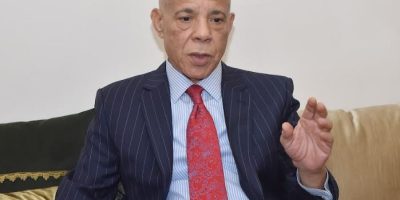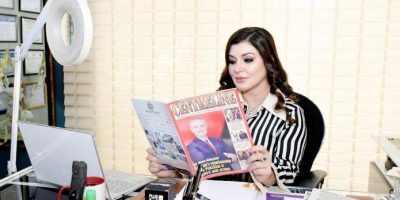Tore Nedrebo : More Norwegian investments in Pakistan on cards

Ambassador of Norway talks to Centreline and DNA
Ansar Mahmood Bhatti
Let’s begin with Pakistan-Norway relations. How would you describe these relations with particular reference to bilateral cooperation in the fields of politics, economy, trade, culture and humanitarian field?
Bilateral relations are close and excellent. There are several reasons for this. The large Pakistani diaspora in Norway, counting some 40,000 individuals, means there is a lot of exchange between the two countries and considerable awareness of Pakistan in Norway. Our current foreign minister visits Pakistan practically every year, and even the prime ministers meet regularly.
There could be more trade, but because of the mobile telephone operator Telenor, Norway was in fact the second biggest source of Foreign Direct Investment (FDI) in Pakistan in the fiscal year ending June 2016. Telenor is the no. 2 mobile operator in Pakistan, with a subscriber base of nearly 40 million.
Since 2005, the company has invested about USD 3.5 billion in Pakistan, has created over 5,000 direct jobs (including Tameer Bank), and has a network of over 200,000 retailers. Both Telenor and other Norwegian companies plan considerable new investments in Pakistan in the near future. Moreover, over many years Norway has provided Pakistan with substantial development and humanitarian aid. The total amount disbursed for these purposes in 2016 was in excess of USD 15 million. The Mela Music Festival, taking place in Oslo around August 14th every year since 2001, has a Pakistani focus.
How do you see the role of Pakistanis in the development of Norway? What is the level of their participation in Norwegian local and central governments?
I think the Pakistani diaspora in Norway has adapted quite successfully and are making valuable contributions to Norwegian society in a variety of ways. Many of them have reached high positions as lawyers, medical doctors, researchers, business people, politicians etc. For instance, Ms Hadia Tajik, whose parents were born in Pakistan, was minister of culture in a previous government and is now deputy leader of Norway’s biggest political party, the Labour Party. Ms Laila Bokhari, whose father came from Pakistan, is currently a deputy foreign minister.
Reportedly, cases of forced marriages and frauds by the Pakistani community are increasing. Do you think this is a problem and what kind of mechanisms are in place to address such issues?
I am not sure if Norwegians with a Pakistani background commit more crimes on average than other Norwegians, and forced marriages do not occur only in the Pakistani community. But Norwegian authorities have implemented a number of measures to deal with such challenges. Crime in Norway is of course a matter for the regular Norwegian police. There is also a Nordic liaison police officer attached to the embassy who is working on transnational crime. To deal with forced and under-age marriages and related practices we employ a number of advisers in Norwegian schools, health services, child welfare services and also in the police. At the embassy in Islamabad there is an advisor who works full-time to counteract forced and under-age marriages, through networking, giving advice in specific cases and by other means.
What kind of guarantees are available to the Muslim community as well as other immigrant communities in Norway, particularly when a few political parties do not quite approve of the presence of these immigrants?
The Norwegian constitution guarantees the freedom of faith, expression and assembly as well as the other fundamental freedoms. All parties represented in the Norwegian parliament accept and appreciate the presence of immigrants in Norway, although I cannot vouch for each and every individual Norwegian in this regard.
All these parties, including the right-wing Progress Party, have party members and leaders with an immigrant background and who are Muslims. Muslims enjoy the same rights in Norway as people of any other denomination. There are strict laws against discrimination, and those who feel they have been discriminated against based on gender, ethnicity, sexual orientation, age, disability or religion, can address their grievance to the Equality and Anti-Discrimination Ombud or the courts. The big public debate over the last years has been about how many refugees and asylum-seekers we should accept. On this, even the immigrant community in Norway is divided.
What are your views on democracy in Pakistan? Also, how do view Pakistan’s role in war on terror?
I find it very encouraging that Pakistan has had democratically elected governments since 2008. Democracy now seems to have stabilised in the country, which is good for the Pakistani people as well as for the country’s social and economic development. However, democracy is always work-in-progress, and empowerment of the broader segments of Pakistani society remains a huge challenge. In my opinion, better education is key to making progress.
Norway, as we are aware, plays a substantive role when it comes to peacemaking efforts the world over. Is there any possibility that Norway could play an active role on the Kashmir issue with a view to bringing both Pakistan and India closer?
We continue to try and contribute to peace and reconciliation both between and within countries. In some cases we are successful, in others not. A prerequisite for success is that all parties concerned are genuinely committed to peace and that they agree on any possible mediator. We are of course open to play our part if conditions allow, but at present, we have no joint request and do not foresee any Norwegian role related to Kashmir.
It is very heartening to know that Norway has been at the top of the UNDP’s Human Development Index since 1999. What is the secret of this achievement?
Personally, I think the decisive factors behind the Norwegian success story have been our relatively protected, remote geographical location in Europe, abundant natural resources, of which petroleum has been particularly significant since the 1970s, an educated, hard-working and disciplined people, and a democratic system that has produced socially just and effective policies.
Since the oil price has fallen considerably and our petroleum stocks are being depleted, we need to transition to a more diverse, less petroleum-dependent economy. Still, we have saved much of the petroleum revenues, and Norway continues to be one of the richest countries per capita in the world. The economic prospects for 2017 look quite good.
How do you view the scope for future business for Norwegian companies in Pakistan and what are your comments on the business environment here?
Telenor is by far the biggest Norwegian company here. As I mentioned, they have already invested large amounts in Pakistan and are planning significant further investments. In addition, a Norwegian solar company is ready to invest USD 250 million, and probably more later. There are a few other Norwegian companies here, like Jotun paints, NERA Telecommunications and Brighterlite, which lease out home solar power units to households, as well as a Norwegian ship-owner, Höegh, which will provide a floating storage and regasification unit (FSRU) for a new gas terminal in Karachi soon. Norwegian shipping companies have many decades of experience in serving Karachi. But Pakistan remains a challenging market. Companies need a predictable, secure and stable business environment for their investments.
Other than Norway, all other Scandinavian countries are members of the European Union, though it is part of Schengen visa regime. Will we see Norway in the EU in the near future?
Norway and Iceland are not only part of the Schengen co-operation, but also of the European Economic Area, or single market, which provides for the free circulation of goods, services, labour and capital among 30 European countries, including the EU. However, a new Norwegian referendum on EU membership is not likely in the foreseeable future.
What steps have you taken to ensure that illegal immigrants do not use Norwegian borders to enter other EU countries?
This question has become more pertinent after the 2016 increase in the number of people seeking asylum or for a better life in Europe. Among the measures Norway has taken is to temporarily reintroduce border control on its border with other Schengen states. We are also very vigilant in enforcing our visa regulations and refugee policies.
Related News

Pakistan-Africa ties poised for a quantum leap
Ambassador of Morocco Mohammad Karmoune says African Continental Free Trade Agreement presents an opportunity forRead More

DR SHUMAILA KHAN: An Aesthetic Physician par excellence
Mudassar Raja INTRODUCTION: Dr. Shumaila Khan is a well-known & energetic Aesthetic Physician, best InjectorRead More


Comments are Closed